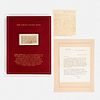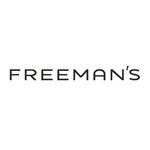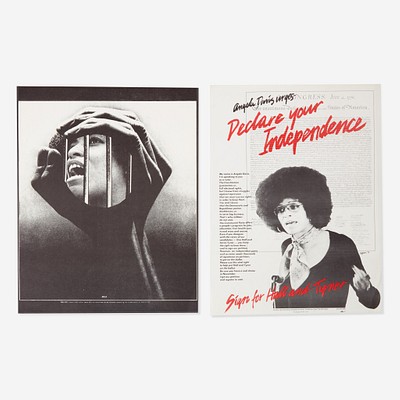[Americana] Hancock, John Signed Lottery Ticket
About Seller
2400 Market St
Philadelphia, PA 19147
United States
Established in 1805, Freeman’s Auction House holds tradition close, with a progressive mind-set towards marketing and promotion, along with access to a team of top experts in the auction business. And now with offices in New England, the Southeast, and on the West Coast, it has never been easier to ...Read more
Two ways to bid:
- Leave a max absentee bid and the platform will bid on your behalf up to your maximum bid during the live auction.
- Bid live during the auction and your bids will be submitted real-time to the auctioneer.
Bid Increments
| Price | Bid Increment |
|---|---|
| $0 | $25 |
| $500 | $50 |
| $1,000 | $100 |
| $2,000 | $200 |
| $3,000 | $250 |
| $5,000 | $500 |
| $10,000 | $1,000 |
| $20,000 | $2,000 |
| $30,000 | $2,500 |
| $50,000 | $5,000 |
| $100,000 | $10,000 |
About Auction
Sep 23, 2021
A collection of books and manuscripts. Curated by Darren WInston, Head of the Books and Manuscripts Department at Freeman's. Freeman's info@freemansauction.com
- Lot Description
Boston, June, 1765. Printed Faneuil-Hall lottery ticket, No. Five, boldy signed at bottom by Founding Father, John Hancock; signed on verso by ticket purchasers. The ticket states: "The Possessor of this Ticket (No. 3741)/is intitled (sic) to any Prize drawn against said/Number, in a Lottery granted by an Act of/the General Court of the Province of the Massachusetts-/Bay, for the Rebuilding Faneuil-Hall; subject to no/Deduction." Hinge-mounted at top to a larger sheet; in red morocco and cloth presentation case. 1 3/4 x 3 1/8 in. (44 x 79 mm). Lot includes provenance documentation: A.L.s., from John Hancock's grand-nephew, Charles L. Hancock (1810-90); T.L.s. from Philip G. Nordell.
Built as a gift to the city by Boston merchant Peter Faneuil in 1743, Faneuil Hall, nicknamed the "Cradle of Liberty", was an important site in the years leading up to the American Revolution. As a meeting house it hosted some of the most fiery debates surrounding independence from the British Crown. The morning after the Boston Massacre, on March 6, 1770, the first public meeting was held in the packed hall, with Samuel Adams giving an impassioned speech. It was also here that the first long standing Committee of Correspondence was established in a town hall vote in late 1772, and on November 29, 1773 a meeting in protest of the tea tax voted "to do the utmost in its power to prevent the landing of the tea."
Almost completely burned down on January 18, 1761, a series of lotteries were organized to raise funds for the rebuilding of the hall. John Hancock (1737-93), newly elected to the five-person Boston Board of Selectmen (Boston's governing board until the 1820s), helped organize these lotteries, and signed the tickets. The hall was reopened on March 14, 1763 with James Otis, Jr. delivering an address dedicating the hall to the cause of liberty.
The June 1765 lottery tickets are much more scarce than the April 1767 tickets, also signed by Hancock. Rare.
Charles L. Hancock
Mrs. Winthrop G. Ray, gifted from Charles L. Hancock, March 6, 1861
Philip H. and A.S.W. Rosenbach Foundation
Philip G. Nordell; gifted, November 29, 1961
Christie's, New York, Fine Printed Books and Manuscripts, 6/14/2005, Sale 1534, Lot 295
- Shipping Info
-
No lot may be removed from Freeman’s premises until the buyer has paid in full the purchase price therefor including Buyer’s Premium or has satisfied such terms that Freeman’s, in its sole discretion, shall require. Subject to the foregoing, all Property shall be paid for and removed by the buyer at his/ her expense within ten (10) days of sale and, if not so removed, may be sold by Freeman’s, or sent by Freeman’s to a third-party storage facility, at the sole risk and charge of the buyer(s), and Freeman’s may prohibit the buyer from participating, directly or indirectly, as a bidder or buyer in any future sale or sales. In addition to other remedies available to Freeman’s by law, Freeman’s reserves the right to impose a late charge of 1.5% per month of the total purchase price on any balance remaining ten (10) days after the day of sale. If Property is not removed by the buyer within ten (10) days, a handling charge of 2% of the total purchase price per month from the tenth day after the sale until removal by the buyer shall be payable to Freeman’s by the buyer. Freeman’s will not be responsible for any loss, damage, theft, or otherwise responsible for any goods left in Freeman’s possession after ten (10) days. If the foregoing conditions or any applicable provisions of law are not complied with, in addition to other remedies available to Freeman’s and the Consignor (including without limitation the right to hold the buyer(s) liable for the bid price) Freeman’s, at its option, may either cancel the sale, retaining as liquidated damages all payments made by the buyer(s), or resell the property. In such event, the buyer(s) shall remain liable for any deficiency in the original purchase price and will also be responsible for all costs, including warehousing, the expense of the ultimate sale, and Freeman’s commission at its regular rates together with all related and incidental charges, including legal fees. Payment is a precondition to removal. Payment shall be by cash, certified check or similar bank draft, or any other method approved by Freeman’s. Checks will not be deemed to constitute payment until cleared. Any exceptions must be made upon Freeman’s written approval of credit prior to sale. In addition, a defaulting buyer will be deemed to have granted and assigned to Freeman’s, a continuing security interest of first priority in any property or money of, or owing to such buyer in Freeman’ possession, and Freeman’s may retain and apply such property or money as collateral security for the obligations due to Freeman’s. Freeman’s shall have all of the rights accorded a secured party under the Pennsylvania Uniform Commercial Code.
-
- Buyer's Premium



 EUR
EUR CAD
CAD AUD
AUD GBP
GBP MXN
MXN HKD
HKD CNY
CNY MYR
MYR SEK
SEK SGD
SGD CHF
CHF THB
THB![[Americana] Hancock, John Signed Lottery Ticket](https://s1.img.bidsquare.com/item/l/9242/9242266.jpeg?t=1MmbG3)
![[Americana] Hancock, John Signed Lottery Ticket](https://s1.img.bidsquare.com/item/s/9242/9242266.jpeg?t=1MmbG3)











